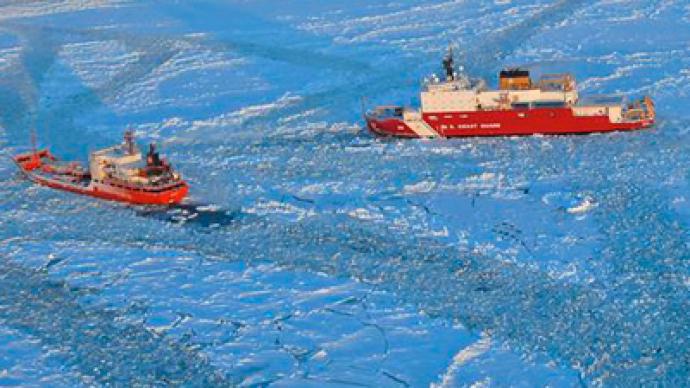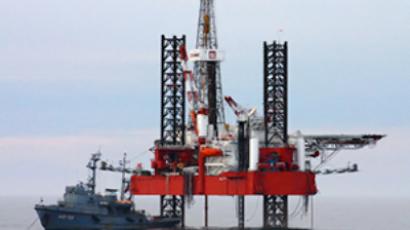Friends in deed: US-Russia rescue mission cutting through ice

Severe weather conditions are delaying the delivery of 5,000 tonnes of fuel to the Alaskan city of Nome, as a Russian tanker and a US icebreaker struggle to make their way through ice. Some 3,500 people in Nome have been left without enough fuel.
Fazil Aliyev, head of the Russian company that operates the tanker Renda, told RT, that the company is tracking the vessel’s path via satellite and according to their information the tanker and accompanying icebreaker are 70 nautical miles away from Nome.
The US Coast Guard say the ice is up to four feet (some 1.3 meters) thick in places and the icebreaker Healy is normally able to cover about 10 nautical miles a day through the ice this thick.
However, strong winds and currents are hampering its efforts, while air temperature in the area is dropping to minus 50 degrees Celsius.
"They have been experiencing a lot of weather challenges with the wind and the currents, that have made it difficult for them to make a lot of progress," US Coast Guard spokeswoman Veronica Colbath said on Wednesday.
If weather conditions do not change, the vessels are expected to reach their destination in 10-14 days. However, the US authorities point out that such mission is of great interest in its own right and a perfect opportunity to learn the capabilities of their icebreaker.
“We have never had a mid-winter 300-nautical-mile trip to Nome. But for us it is a great opportunity to learn what the Healy is capable of and gain navigation experience in such ice conditions,” Colbath said.
If successful, the shipment would mark the first time petroleum products have been delivered by sea to a western Alaskan community in winter. The mission also represents a logistical challenge, as it is coordinated by the American and Russian sides through interpreters.
Russia rushes to rescue
Before the mission kicked off, the organizers had to clear it through Washington, because, in accordance with the law of 1920, only vessels whose owners and operators are US companies are allowed to deliver petroleum products to Alaska. The Renda tanker, however, belongs to the Russian Expert and Marine Surveyors' Corporation based in Vladivostok, in the Russian Far East.
The town of Nome was plunged into a critical situation with fuel when the autumn fuel delivery by US barges was disrupted by a heavy storm. The idea to airlift petroleum products was quickly rejected because in this case their price would skyrocket by US$3 to $4 per gallon (3.8 liters).
Authorities concluded that chartering a Russian tanker would be the best alternative.
Fazil Aliyev told RT that one of the reasons why a Russian tanker was chosen for this operation is that US companies simply do not possess tankers of the class Renda belongs to. He also said that the cost of this operation would be way higher if it was carried out by a US company.
“Our main goal is not so much to make profit, but to rescue people,” Aliyev stated.
He believes the operation is definitely going to be a success and the tanker will reach its point of destination. However, he said the tanker will not be able to dock in the port, so the fuel will be delivered to the coast via special hosepipes the vessel is equipped with.
It is not the first time Renda is delivering fuel to an ice-bound territory. In 2000 the tanker took part in a similar operation when a town in Russia’s Chukotka region was left without fuel in the middle of winter. Although the operation was successful media reports dubbed it a “golden passage” due to the high costs of the voyage.













